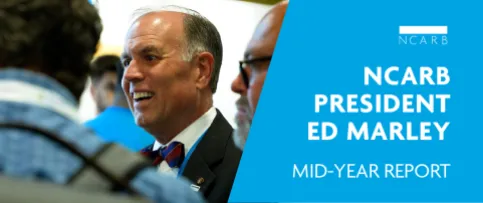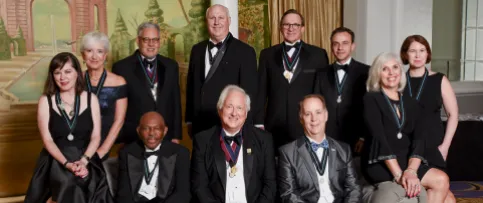Washington, DC—Robert E. Luke, AIA, the 2006-2007 president of the National Council of Architectural Registration Boards (NCARB), recently awarded the President’s Medal for distinguished service to four individuals who have made significant contributions to the protection of the public health, safety, and welfare through their service to NCARB and to the practice of architecture.
The 2007 medalists were honored at the close of NCARB’s 88th Annual Meeting and Conference, which was held in late June in Denver, CO. The President’s Medal was first awarded in 1994 in order to recognize those individuals who dedicate a considerable part of their careers, energy, and wisdom to benefit the public and the architectural profession.
Since July 2002 when he was named legal counsel, Dan Taylor has guided the Council through matters as diverse—and as complicated—as developing a cohesive response to security infractions involving the Architect Registration Examination® (ARE®) to re-envisioning NCARB’s employee retirement program. He also served as legal counsel for the Committee on Professional Conduct for 22 years, where he helped maintain the highest standards of ethical and professional conduct for the architectural profession. In addition, he authored the Professional Conduct monograph, a perennial best seller in the Council’s highly regarded health, safety and welfare monograph series.
Mark Saccoccio, AIA has made many notable contributions to NCARB. He was a dedicated member f the Carnegie/Boyer Task Force and the Internship Implementation Task Force, two groups that moved the Council closer to its objective to better integrate architectural practitioners and their academic counterparts as a means to strengthen the profession. Saccoccio also served on NCARB’s Committee on Procedures and Documents and the Electronic Technology Task Force, which he chaired in Fiscal Year 1998. As a two-term member and former chair of the Rhode Island Board of Examination and Registration of Architects, Saccoccio devoted a decade to learning about and shaping the regulatory issues that define the architect profession. On the regional level, Saccoccio was elected secretary/treasurer for the New England Council of Architectural Registration Boards for three consecutive years. Currently Saccoccio leads AIA Rhode Island in addition to designing projects for his successful Cranstonbased firm and his ongoing service to NCARB. Saccoccio was recognized for his outstanding contributions to the Council and to the profession.
For 32 years as the executive director of the Louisiana Board of Architectural Examiners, Mary “Teeny” Simmons has guided emerging professionals and architects through the registration process. Simmons has been named to a number of committees and lent her perspective to a diverse range of Council issues and initiatives, including efforts to sustain and improve the Intern Development Program. One of Simmons’ most significant contributions was serving as an integral member of the Disaster Response Task Force. In the aftermath of Hurricanes Katrina and Rita, she has been a steady, knowledgeable presence for Louisiana’s architectural community.
Since the late 1970s, Roger Meyer of Portland, OR, has dedicated a significant portion of his public service career to representing the interests of the architectural profession. In 1977, he was named to the Oregon Board of Architect Examiners as one of its first two public members. Less than a decade later, Meyer was elected chair of the Western Conference of Architectural Registration Boards, and subsequently served on the NCARB Board of Directors where he represented Region 6. His legal expertise, augmented by a genuine interest in architecture and a fondness for the company of architects, has informed his work with some of the Council’s most essential committees. Meyer was a vocal supporter of formal educational requirements for registered architects and an early backer of the Intern Development Program. Among his committee assignments, he has chaired and been a member of the Reciprocity Impediments Task Force and several iterations of the Committee on Procedures and Documents.
Editor's Note: NCARB's Monograph Series was renamed the Continuum Education Program in early 2020.





